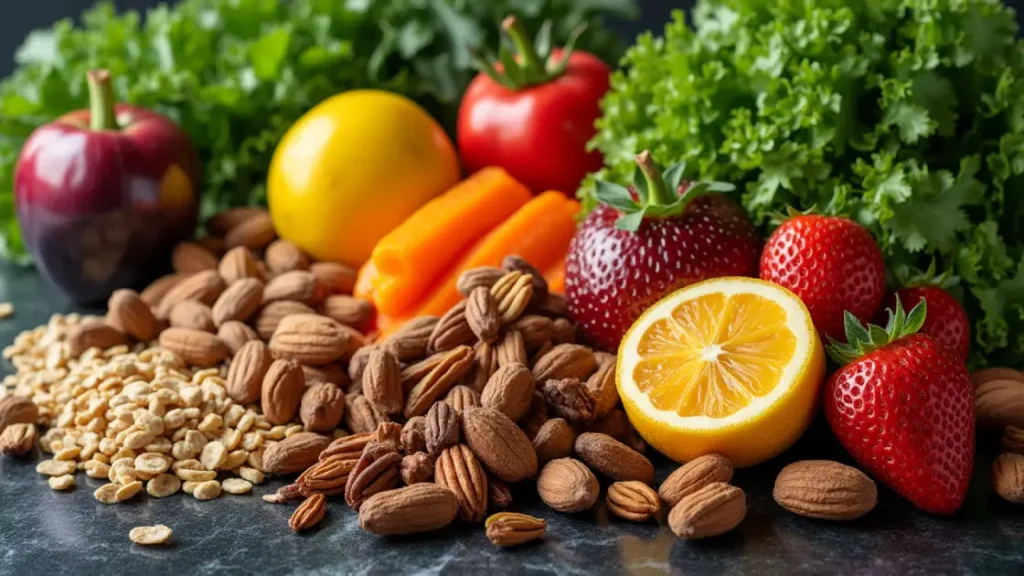Table of Contents
Introduction: Warm Up This Winter with Healthy Comfort Food
As the winter chill sets in, we often crave hearty, comforting meals that not only warm us up but also nourish our bodies. Healthy Comfort Food Winter offers the perfect balance of both, allowing you to indulge in delicious dishes while maintaining your well-being. With the right combination of wholesome ingredients, these meals provide the ultimate comfort without compromising on nutrition.
This winter, you don’t have to choose between taste and health. Healthy Comfort Food Winter lets you enjoy flavorful, satisfying recipes that support your health goals. Whether you’re preparing a cozy meal for yourself or sharing it with loved ones, these dishes are the ideal way to embrace the season while staying energized and feeling good.
Let’s dive into a variety of delicious, nutritious, and guilt-free options to keep you satisfied all season long.
Healthy Winter Soups: Warm, Hearty, and Full of Flavor

When it comes to healthy comfort food winter, soups are at the top of the list. They’re easy to prepare, versatile, and perfect for cold days. Here are a few standout options:
1. Classic Chicken and Vegetable Soup
| Ingredient | Quantity |
|---|---|
| Shredded chicken breast | 2 cups |
| Carrots, diced | 1 cup |
| Celery, diced | 1 cup |
| Onions, chopped | 1 cup |
| Low-sodium chicken broth | 2 cups |
| Parsley, thyme, bay leaf | To taste |
| Salt and pepper | To taste |
- Health Benefits:
- High in protein and vitamins
- Low in calories and fat
- Calories: 150 calories per serving
2. Roasted Tomato and Red Pepper Soup
| Ingredient | Quantity |
| Tomatoes, roasted | 4 large |
| Red bell peppers, roasted | 2 large |
| Garlic cloves | 3 cloves |
| Almond milk | 1 cup |
| Fresh basil | For garnish |
- Calories: 120 per serving
- Why It’s Healthy: Packed with antioxidants and Vitamin C.
3. Lentil and Sweet Potato Soup
| Ingredient | Quantity |
| Lentils | 1 cup |
| Sweet potatoes, diced | 2 cups |
| Onion, chopped | 1 medium |
| Cumin | 1 tsp |
| Turmeric | 1 tsp |
| Vegetable broth | 4 cups |
- Calories: 180 per serving
- Benefits: Fiber-rich and great for digestion.
As studies on PubMed show, consuming nutritious food during the winter can boost the immune system.
Light Winter Comfort Meals: Indulge Without the Guilt

Comfort meals don’t have to weigh you down. These light winter comfort meals deliver all the flavor with a fraction of the calories.
Healthy Turkey Shepherd’s Pie
| Ingredient | Quantity |
| Ground turkey | 1 lb |
| Peas, frozen | 1 cup |
| Carrots, diced | 1 cup |
| Cauliflower, mashed | 2 cups |
| Olive oil | 1 tbsp |
| Garlic powder | 1 tsp |
| Salt and pepper | To taste |
- Calories: 220 per serving
- Why It’s Healthy: Low in carbs and packed with lean protein.
Zucchini Noodle Lasagna
| Ingredient | Quantity |
| Zucchini, sliced thinly | 3 medium |
| Ground chicken | 1 lb |
| Low-fat ricotta cheese | 1 cup |
| Marinara sauce | 2 cups |
| Mozzarella cheese, shredded | 1 cup |
- Calories: 250 per serving
- Benefits: Gluten-free, low-carb, and rich in protein.
Quinoa and Veggie Stir-Fry
| Ingredient | Quantity |
| Cooked quinoa | 2 cups |
| Broccoli florets | 1 cup |
| Bell peppers, sliced | 1 cup |
| Soy-ginger sauce | 3 tbsp |
- Calories: 200 per serving
- Benefits: High in fiber and plant-based protein.
Nutritious Winter Recipes: Fuel Your Body and Soul

Winter is the perfect time to nourish yourself with wholesome, nutrient-dense meals. These nutritious winter recipes combine comfort with health benefits.
Stuffed Bell Peppers
| Ingredient | Quantity |
| Bell peppers | 4 |
| Cooked quinoa | 1 cup |
| Black beans | 1 cup |
| Diced tomatoes | 1 cup |
| Cumin | 1 tsp |
| Paprika | 1 tsp |
| Chili powder | 1 tsp |
| Shredded low-fat cheese | Optional |
- Calories: 210 per serving
- Health Benefits: High in fiber, protein, and antioxidants.
Butternut Squash and Kale Risotto
| Ingredient | Quantity |
| Arborio rice | 1 cup |
| Butternut squash, pureed | 2 cups |
| Fresh kale, chopped | 1 cup |
| Olive oil | 1 tbsp |
| Garlic | 2 cloves, minced |
- Calories: 280 per serving
- Why It’s Healthy: Provides Vitamins A and C, plus calcium from the kale.
Baked Salmon with Garlic and Lemon
| Ingredient | Quantity |
| Salmon fillets | 4 (4 oz each) |
| Olive oil | 2 tbsp |
| Garlic, minced | 2 cloves |
| Lemon juice | 2 tbsp |
- Calories: 300 per serving
- Benefits: Rich in Omega-3 fatty acids, which are excellent for heart health.
Research published by the National Institutes of Health indicates that vitamin-rich foods help boost overall health during the winter.
Warm Healthy Meals for Winter: Comforting and Nourishing

These warm healthy meals for winter will keep you cozy while nourishing your body with the nutrients it needs.
Vegetarian Chili
| Ingredient | Quantity |
| Kidney beans | 1 cup |
| Black beans | 1 cup |
| Tomatoes, diced | 2 cups |
| Onion, chopped | 1 medium |
| Chili powder | 1 tbsp |
| Cumin | 1 tsp |
- Calories: 220 per serving
- Why It’s Healthy: High in plant-based protein and fiber.
Baked Chicken Thighs with Root Vegetables
| Ingredient | Quantity |
| Chicken thighs | 4 |
| Carrots, sliced | 1 cup |
| Parsnips, diced | 1 cup |
| Sweet potatoes, cubed | 1 cup |
| Olive oil | 2 tbsp |
| Garlic powder | 1 tsp |
- Calories: 310 per serving
- Benefits: A balanced meal with lean protein and complex carbs.
Cabbage and Sausage Stir-Fry
| Ingredient | Quantity |
| Cabbage, shredded | 2 cups |
| Turkey sausage | 2 links, sliced |
| Garlic powder | 1 tsp |
| Paprika | 1 tsp |
- Calories: 200 per serving
- Why It’s Healthy: Low-carb, high in protein, and easy to prepare.
Tips for Making Healthy Comfort Food Winter Recipes

Transforming traditional comfort foods into healthy, guilt-free options doesn’t have to be complicated. By following these practical tips, you can enjoy delicious meals that nourish your body and warm your soul during the chilly winter months. Here’s how:
1. Use Whole Ingredients
- Replace processed ingredients with whole, natural options. For example:
- Swap white rice for quinoa, farro, or brown rice.
- Use whole-grain bread or pasta instead of refined versions.
- Whole ingredients are higher in fiber, vitamins, and minerals, making your meals more nutrient-dense.
2. Choose Lean Proteins
- Opt for lean cuts of meat like chicken breast, turkey, or fish instead of fattier options.
- Experiment with plant-based protein sources such as lentils, chickpeas, and tofu for a lighter yet filling meal.
- For example, replace ground beef with ground turkey or plant-based crumbles in recipes like shepherd’s pie or lasagna.
3. Add Vegetables to Every Meal
- Incorporate as many vegetables as possible into your dishes. They’re low in calories, high in fiber, and full of essential nutrients.
- Examples:
- Add spinach or kale to soups and stews for an extra dose of vitamins.
- Use spiralized zucchini or spaghetti squash as a low-carb alternative to pasta.
- Bulk up casseroles with chopped carrots, bell peppers, or broccoli.
4. Lighten Up Creamy Recipes
- Replace heavy creams with lighter, healthier options:
- Use Greek yogurt, unsweetened almond milk, or low-fat cream cheese.
- Blend soaked cashews for a creamy yet dairy-free base in soups and sauces.
- This simple swap reduces calories and fat without sacrificing flavor or texture.
5. Reduce Added Sugar and Salt
- Cut down on added sugars by using natural sweeteners like honey, maple syrup, or mashed fruit.
- Reduce sodium by using herbs, spices, and citrus juices to flavor dishes.
- Try garlic, paprika, cumin, or fresh lemon juice to enhance flavors without extra salt.
6. Opt for Healthier Cooking Methods
- Skip frying and go for baking, grilling, steaming, or roasting instead.
- Roasted vegetables like carrots, parsnips, and sweet potatoes develop a naturally sweet flavor and require little seasoning.
- Grilling or baking proteins adds depth of flavor without excess oil or fat.
7. Control Portion Sizes
- Even healthy comfort foods can lead to overindulgence if portions aren’t controlled.
- Use smaller plates or pre-portion meals to avoid overeating.
- Store leftovers immediately to resist the temptation of second helpings.
8. Batch Cooking and Freezing
- Prepare large batches of soups, stews, and casseroles and freeze them in portion-sized containers.
- This saves time and ensures you always have a healthy meal on hand.
- Examples: Freeze lentil soup, vegetable chili, or turkey shepherd’s pie for quick reheating.
9. Experiment with Healthy Swaps
- Replace calorie-dense ingredients with lighter alternatives:
- Swap mashed potatoes for mashed cauliflower in recipes like shepherd’s pie.
- Use oats or almond flour instead of breadcrumbs for a gluten-free and healthier binding agent.
- Substitute oil or butter in baked goods with applesauce or mashed bananas.
10. Boost Flavor with Herbs and Spices
- Enhance the taste of your meals naturally:
- Use fresh herbs like rosemary, thyme, basil, and parsley for added freshness.
- Try warming spices like cinnamon, nutmeg, and ginger to create that cozy winter feel.
- Add chili flakes or cayenne for a kick of heat in stews and soups.
By incorporating these tips into your cooking routine, you can create healthy comfort food winter recipes that are not only nourishing but also irresistibly delicious. These small changes make a big difference in turning traditional comfort dishes into healthier, guilt-free options perfect for winter.
FAQ Section
What is Healthy Comfort Food Winter?
Healthy Comfort Food Winter refers to warm, nourishing meals designed to provide comfort and satisfaction during the colder months while maintaining a focus on nutrition and health. These dishes combine delicious ingredients with health benefits to keep you feeling cozy and energized.
Why should I choose Healthy Comfort Food Winter recipes?
Choosing Healthy Comfort Food Winter recipes allows you to indulge in tasty meals that not only warm you up but also provide essential nutrients for your body. These meals are perfect for staying healthy and satisfied throughout the winter season.
Can I make Healthy Comfort Food Winter dishes for my family?
Absolutely! Healthy Comfort Food Winter recipes are ideal for sharing with family and loved ones. They are easy to prepare, and everyone can enjoy the comfort of a warm, nutritious meal that supports overall wellness.
Are Healthy Comfort Food Winter recipes difficult to prepare?
Not at all! Healthy Comfort Food Winter recipes are designed to be simple and approachable. With just a few wholesome ingredients, you can create delicious dishes that are both nourishing and satisfying, without spending hours in the kitchen.
What are some examples of Healthy Comfort Food Winter meals?
Some examples of Healthy Comfort Food Winter meals include hearty soups, stews, casseroles, and baked dishes made with nutrient-rich vegetables, lean proteins, and whole grains. These recipes offer the perfect combination of warmth, taste, and health benefits.
For more information on how to maintain a healthy diet during the winter, you can visit Mayo Clinic for additional tips.
Conclusion: Stay Cozy and Healthy
Winter is the perfect time to embrace Healthy Comfort Food Winter, as it allows you to enjoy nourishing meals that provide warmth and comfort. With the right recipes, you can indulge in satisfying dishes that help you feel good both inside and out, keeping you energized during the cold months.
By incorporating Healthy Comfort Food Winter into your daily routine, you can make this season not only cozy but also beneficial for your health. Experiment with these wholesome recipes, and discover how they can transform your winter days into a blend of warmth, comfort, and wellness.
Try out the recipes shared in this article, and feel free to share your experience on how they’ve added a cozy touch to your winter days.


5 thoughts on “Healthy Comfort Food Winter: Delicious, Nutritious, and Guilt-Free”